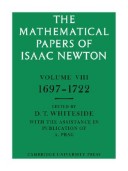When Newton left Cambridge in April 1696 to take up, at the age of 53, a new career at the London Mint, he did not entirely 'leave off Mathematicks' as he so often publicly declared. This last volume of his mathematical papers presents the extant record of the investigations which for one reason and another he pursued during the last quarter of his life. In January 1697 Newton was tempted to respond to two challenges issued by Johann Bernoulli to the international community of mathematicians, one the celebrated problem of identifying the brachistochrone; both he resolved within the space of an evening, producing an elegant construction of the cycloid which he identified to be the curve of fall in least time. In the autumn of 1703, the appearance of work on 'inverse fluxions' by George Cheyne similarly provoked him to prepare his own ten-year-old treatise De Quadratura Curvarum for publication, and more importantly to write a long introduction to it where he set down what became his best-known statement of the nature and purpose of his fluxional calculus.
- ISBN13 9780521201032
- Publish Date 20 August 1981
- Publish Status Inactive
- Out of Print 4 October 2007
- Publish Country GB
- Imprint Cambridge University Press
- Format Hardcover
- Pages 760
- Language English
